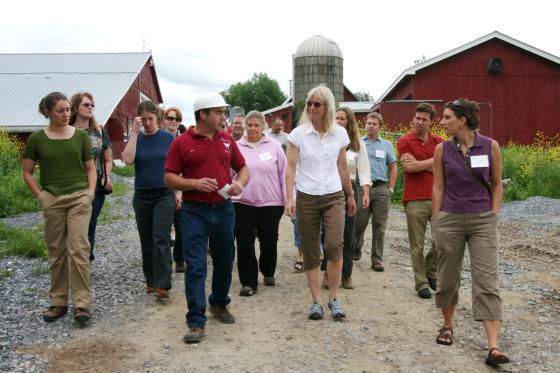Posted March 17, 2022 at 10:36am by Anonymous (not verified)
Vermont Farm Viability Program

Perhaps long ago, in a simpler world, farmers needed only tools, the support of helping hands, a market for their products, and advice from their neighbors to successfully grow vegetables and raise animals. But farmers today need a lot more than that. Complex equipment, well-designed facilities, marketing skills, and a business plan are just some of what’s required for them to be truly “sustainable”: to thrive today in order to exist tomorrow.
For 10 years, the Vermont Farm Viability Program (VFVP) has been providing technical assistance and grants to Vermont farmers, food producers, and other agricultural businesses so they can become more profitable and better managed. Businesses that want to expand, diversify, earn a higher income, become more efficient, or transition to new ownership can apply to the program and, if accepted, may:
- receive two-year, in-depth, one-on-one business planning assistance;
- receive individually tailored technical assistance to help them implement their business plan; and
- apply for grants to fund capital expenses or additional technical support.
Private consultants and nonprofits contracted by VFVP provide the business planning and technical assistance, using methods developed jointly by VFVP and those partners. Primary nonprofit providers are the Intervale Center, Northeast Organic Farming Association of Vermont, UVM Extension, and most recently, Land for Good.
Although a number of Vermont nonprofits offer business planning services that farmers could access, VFVP has developed specific farmer-focused guidelines for its partners. VFVP also evaluates the partners’ work and provides them with four days of professional development trainings a year. The “implementation grants” then help businesses enrolled in the program purchase items or services that will make their business plan a reality (e.g., a walk-in cooler, a cultivation tractor, a hoop house). More than $405,000 has been granted to 99 farms since 2003. Roughly $194,000 has been granted to 19 agriculture-related businesses.
According to Ela Chapin, VFVP’s program director, a majority of the 375 farms that have participated in the program since 2003 saw increases in gross sales and improved management practices the year after they launched their business plans.
Mimi Arnstein, who owns Wellspring Farm, a CSA farm in Marshfield, says she thinks of herself not as a farmer but as a “farm business owner.” Having received business planning support from VFVP in her farm’s early years, as well as a grant to improve drainage on her farm, she now offers business plan mentoring to fellow farmers. “We need to make sure our numbers make sense so we’re not working ourselves into the ground,” Arnstein says. “There’s a sense among the general population that farming is a labor of love but one that’s grueling and masochistic. Well, sustainable farming can’t be grueling and masochistic. We want farms that are going to survive into the future.”
Arnstein says that when potential or existing farmers crunch the numbers, “the hard conclusion may sometimes be that this is not a viable business, so we might lose some farm businesses. But that’s ok, because it will reduce failures and keep failures from happening before they begin.”
Chapin notes a difference between technical assistance and education. The way she sees it, education is for people who aren’t necessarily ready to practice what they’re seeking information about. Technical assistance is for people who are already practicing a skill and want to improve it. She also notes that technical assistance, in VFVP’s case, refers to information provided in a nonclassroom setting. VFVP’s partner organizations often go directly to farms to provide on-site discussions and services.
VFVP is a program of the Vermont Housing and Conservation Board, which funds the program, along with grants from the Working Lands Enterprise Initiative, Northeast Center for Risk Management Education, the Vermont Community Foundation and other private foundations. VHCB took Farm Viability under its wing after the legislature created the program in 2003 because of VHCB’s mission to conserve farmland.
"As VHCB is conserving land, Farm Viability is supporting businesses on the land. The two programs contribute to the presence of the working landscape,” she says.
